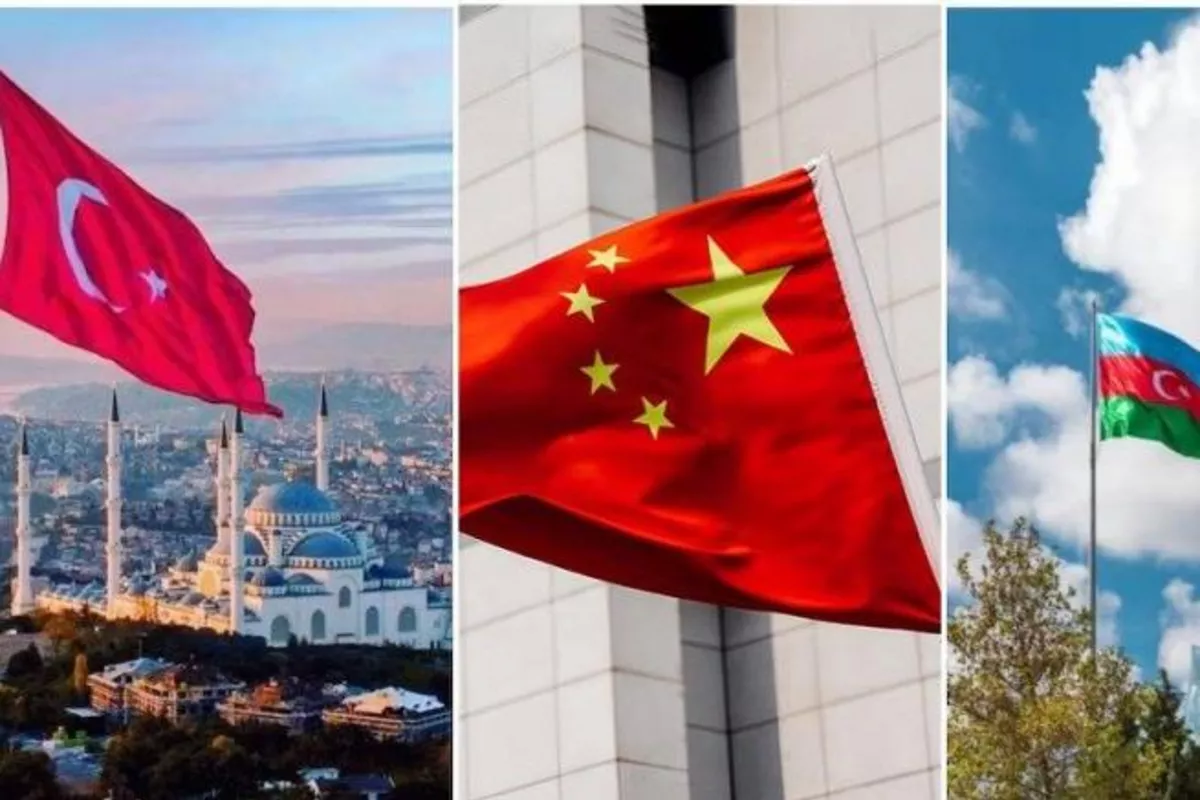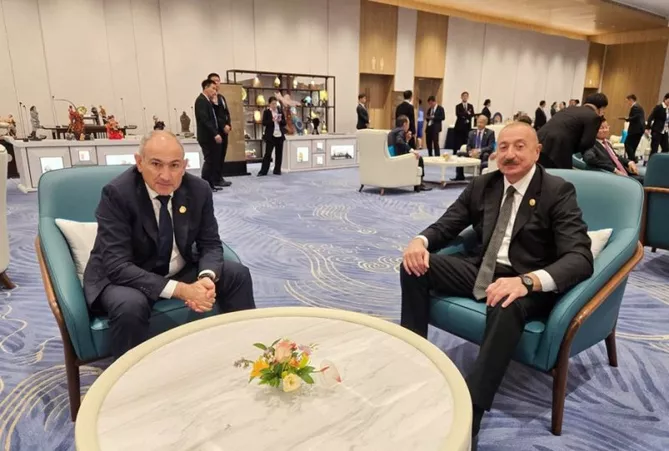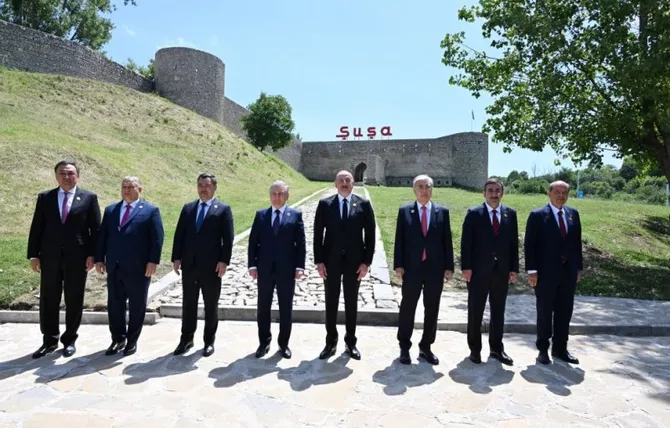
photo: News.az
Amid rapid changes in global politics and growing competition among major power centers, regional summits and diplomatic initiatives that help shape a new balance in Eurasia have become particularly significant. The Shanghai Cooperation Organization (SCO) Summit in Tianjin, along with leaders’ meetings and parallel talks, highlighted key trends in global security and energy. What role do Türkiye and Azerbaijan play in these developments? Why is India’s position controversial? And what place does China hold in Eurasia’s strategic architecture? News.Az discussed these questions with Hazel Cagan Elbir, an international relations expert, regional security specialist, and analyst at the Ankara Center for Eurasian Studies.

Hazel Cagan Elbir, an international relations expert, regional security specialist, and analyst at the Ankara Center for Eurasian Studies
- What is the main role and significance of the current SCO summit in Tianjin for global and regional politics, especially amid current international crises?
- The SCO summit, held from August 31 to September 1, 2025, in Tianjin, China, was the largest in the organization’s history. In the context of strengthening multipolarity in global politics, the SCO serves as an alternative platform to the Western-centric order, under the leadership of China and Russia. The summit reflects China’s aspirations to position itself as a stabilizing factor globally, in response to the unilateral policies of the United States, especially the increased protectionist measures under Donald Trump’s second presidential term.
For Türkiye, the summit offered a platform to advance its multi-vector foreign policy. Since becoming a “dialogue partner” in 2012, Türkiye has used the SCO to demonstrate its growing influence in Eurasia, with President Erdoğan’s active diplomacy at the summit signaling this intent.
The summit also enhanced Asia’s role in the global economic and security architecture. Türkiye’s efforts to connect the Middle Corridor project with China’s Belt and Road Initiative create strategic opportunities for regional trade and connectivity. Moreover, discussions on global issues such as the Ukrainian crisis, the situation in Gaza, and the South Caucasus peace process reinforced the SCO’s potential as not only a regional but also a global actor.
For Türkiye, this represents a chance to maintain ties with the West while deepening strategic relationships with the East. The SCO thus plays a balancing role in Turkish foreign policy alongside Western alliances like NATO and the EU.
- What key aspects of the Azerbaijan-Türkiye strategic alliance were highlighted during the meeting between Presidents Ilham Aliyev and Recep Tayyip Erdoğan, and how do they impact regional energy and transport?
The meeting between Erdoğan and Aliyev in Tianjin focused on bilateral relations and regional and global issues, with particular attention to energy and transport cooperation. Türkiye and Azerbaijan, united under the principle of “one people, two states,” reaffirmed their commitment to developing projects like the TANAP and TAP gas pipelines and the Baku-Tbilisi-Kars railway and Middle Corridor.
Türkiye serves as a key transit country for Azerbaijani natural gas from the Caspian to Europe. TANAP, the backbone of the Southern Gas Corridor, strengthens Europe’s energy security. The discussion also included expanding energy cooperation, increasing Azerbaijani gas supplies to Europe via Türkiye, and launching new projects. This not only reinforces Türkiye’s ambition to become an energy hub but also elevates its strategic importance for Europe.
The Middle Corridor, linked with China’s Belt and Road Initiative, is a critical transport route for both countries, with the Baku-Tbilisi-Kars railway as its backbone. Erdoğan and Aliyev expressed interest in increasing the line’s capacity and developing new links, such as the Zangezur Corridor, to enhance regional connectivity. This aligns with Türkiye’s vision of becoming a logistics hub between Asia and Europe and supports its strategy to reduce reliance on Russian energy.

Photo: AZERTAC
- How can the meeting between the leaders of Azerbaijan and Armenia on the sidelines of the SCO summit be assessed? How constructive was the dialogue, and to what extent does it reflect progress achieved in Washington?
The meeting between Aliyev and Pashinyan was a constructive step in the Azerbaijan-Armenia peace process. The two leaders discussed the peace agenda, emphasizing mutual trust and regional stability. Positive momentum from the Washington trilateral summit on August 8, 2025, under Trump’s auspices, continued in Tianjin. In Washington, the parties jointly proposed dissolving the OSCE Minsk Group, seen as a key milestone in the peace process.
The Tianjin meeting consolidated these achievements, with discussions on border demarcation, the Zangezur Corridor, and prisoner exchanges. For Türkiye, this was a positive signal toward lasting peace in the South Caucasus. By supporting Azerbaijan’s territorial integrity, Ankara also facilitates normalization with Armenia. While domestic political instability in Armenia and external influences-particularly from Russia and the West-underscore the fragility of the process, holding the meeting at a neutral SCO venue is an encouraging sign for continued dialogue.
- What were Nikol Pashinyan’s expectations from his meeting with Vladimir Putin? How is Moscow managing its influence in the Armenia-Azerbaijan normalization process?
Pashinyan’s meeting with Putin carried clear expectations. While details remain limited, it was viewed as a key moment at the SCO summit. Russia seeks to maintain influence in the South Caucasus and control the normalization of Armenia-Azerbaijan relations. Historically, Russia has been a primary mediator, but the collapse of the OSCE Minsk Group and Türkiye’s rising role have limited its leverage.
The meeting likely focused on strengthening Armenia’s economic and political ties with Moscow, assessing the impact of Western sanctions on Armenia, and Russia’s mediation role in the peace process. Armenia remains dependent on Russia as a CSTO member, but Pashinyan’s westward rapprochement irritates the Kremlin. Russia aims to retain control over the process and prevent Türkiye or the West from dominating. For Ankara, it is crucial that Moscow acts constructively rather than obstructively, though Russian pressure on Yerevan may slow negotiations. Türkiye maintains dialogue with Moscow to ensure it plays a useful role.
- What was the main focus of talks between Türkiye and Russia’s presidents, and how is Ankara balancing Moscow and Baku’s interests amid the South Caucasus peace process?
The discussions largely revolved around Russia’s role in the peace process, its economic and military ties with Armenia, and the effects of Western sanctions. Moscow retains key leverage, such as the Zangezur Corridor and Karabakh peacekeepers, while simultaneously developing relations with both Baku and Yerevan. Türkiye seeks Russia’s constructive involvement but aims to ensure that pressure on Armenia does not derail negotiations, maintaining Ankara’s role as a balancing actor between Moscow and Baku.
- What role does China play in the summit, considering the Belt and Road Initiative, global development, and security? How is Azerbaijan positioned within Chinese strategic projects?
Azerbaijan is a strategic hub for the Belt and Road Initiative. Located on the western Caspian coast, it anchors the Middle Corridor connecting China to Europe. The Baku Port and Baku-Tbilisi-Kars railway facilitate Chinese goods reaching Europe via Türkiye. Xi Jinping’s support for Azerbaijan’s SCO accession highlights its strategic significance. Caspian energy resources, including oil and gas, are vital for China’s energy security, with projects like TANAP contributing to import diversification. Azerbaijan’s position linking Central Asia, the Caucasus, and Europe expands China’s economic and political influence in Eurasia.

Photo: AZERTAC
- How will this year’s Summit of the Organization of Turkic States (OTS) in Baku contribute to these dynamics?
The OTS Summit will strengthen integration among Turkic nations, promoting economic, cultural, and political cooperation. It can indirectly support the South Caucasus peace process. For Azerbaijan, hosting the summit consolidates its regional leadership post-Karabakh victory. By backing the peace process, the OTS promotes stability in the South Caucasus, while Türkiye’s mediating role may become more visible. Additionally, the summit bolsters coordination on strategic projects like the Middle Corridor and energy initiatives, potentially driving new investment and implementation that aligns with SCO priorities.
- How should India’s refusal to support the Belt and Road Initiative and opposition to Azerbaijan’s SCO accession be interpreted? What are the potential implications for regional geopolitics and Azerbaijan-India relations?
The OTS strengthens a shared Turkic identity and enhances Azerbaijan and Türkiye’s regional influence, offering leverage in interactions with powers like Russia and China. India’s opposition reflects its geopolitical interests in the South Caucasus and its close ties with Armenia. By supporting Yerevan, India limits Azerbaijan’s influence in the SCO and counters China’s regional ambitions. While Russia and China back Azerbaijan’s full membership, India’s position blocks consensus-based decisions, illustrating multipolar competition within the SCO and limitations on its expansion.
India’s stance also weakens SCO economic integration, as the Belt and Road Initiative is central to regional projects. Close Armenia-India military and economic cooperation, including arms sales, is seen by Azerbaijan as unfriendly, raising tensions and mistrust. However, Azerbaijan, with strong ties to Russia, China, and Türkiye, can offset Indian pressure. Türkiye will continue to support Baku and may strengthen cooperation with China and Russia to advance Azerbaijani interests. India’s opposition is unlikely to isolate Azerbaijan but may reduce India’s influence in the South Caucasus, highlighting the strategic importance of the Azerbaijan-Türkiye alliance.
Share on social media